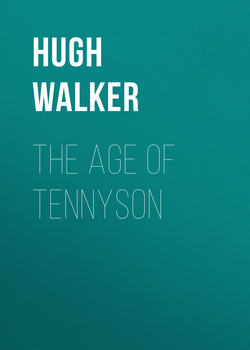Читать книгу The Age of Tennyson - Hugh Walker - Страница 1
PREFACE
ОглавлениеThe age of Tennyson is defined, for the purpose of the present volume, as extending from 1830 to 1870. The date selected as the beginning of the period needs no explanation; but perhaps the question may be asked why the age of Tennyson should be supposed to end more than twenty years before Tennyson died. The answer is twofold. First, I may plead the strong law of necessity. Sixty years, among the most fertile and varied in our literary history, could be compressed within the limits of a volume like the present only by completely changing the scale of treatment; and this again would have put it out of harmony with the other volumes of the series. But, secondly, about the year 1870 or before it there took place a change in the personnel of literature, less complete perhaps than that which marked the beginning of the epoch, but still sufficiently remarkable. Among the historians, Macaulay was dead and Carlyle had done his work. Among the novelists, Dickens died in 1870, Thackeray seven years before, and Charlotte Brontë still earlier; while, though George Eliot survived till 1880, the only great work of hers which lies beyond the limits of the period is Middlemarch. Mill, who had been so long the dominant power in philosophy, died in 1873. The poets, Tennyson, Browning, Matthew Arnold and Rossetti, survived. In poetry however Arnold’s voice was by this time almost dumb. Browning continued to produce copiously; but after The Ring and the Book his style changed, and changed decidedly for the worse. Tennyson changed too, but in his case there was some gain to balance what was lost. The best of the younger poets, like William Morris and Swinburne, clearly show the influence of new ideals. The old order was changing, and new ambitions were beginning to sway men’s minds. In short, if by the age of Tennyson we mean the period during which the influences which formed Tennyson and his contemporaries were dominant, we find that it came to an end long before Tennyson’s life closed.
Tennyson and Browning, Arnold and Ruskin, therefore, have to be treated as survivors into a new period. But it is obviously undesirable to split a man’s work in two; and consequently, though my period ends at 1870, I have included a sketch of the later work of these men as well. I have very rarely treated only a part of a man’s work. I have preferred to leave wholly to my successor those writers who, though they had begun to write before 1870, seem on the whole to belong rather to the period still current.
In the plan of this book I have tried to follow out as faithfully as possible the general idea of the series to which it belongs; and thus I have been led rather to emphasise the thought of the greater men than to concern myself about including notices of a great number of minor writers. In a period so prolific it has therefore been necessary to enforce a somewhat rigid law of exclusion. The law has been made especially rigid in the case of fiction; because there is nothing that bears the test of time so ill as bad or mediocre fiction.
Variety is, after copiousness, the most striking feature of the period under review; and this variety somewhat obscures the operation of ruling principles and ideas. I have taken as my guide the conviction that the key to the period is to be found in its search for truth and its resolve to understand. We see this everywhere, in the development of science, in the inquiry into the causes of the growth and decay of nations, in the intellectual quality of the best poetry, in the analytical psychology of so much prose fiction. It is the reaction against the extreme romanticism of the revolutionary period. The writers of the Revolution sought to grasp truth by an act of faith. In the Victorian period emotion plays a less and logic a greater part. Or we may describe the change as a partial reversion to the spirit of the eighteenth century. The imaginative glamour of the romantic movement is not lost, but there is conjoined with it a juster appreciation of the clearness and precision and the logical coherency of the age of Pope. Next to the eighteenth century the age of Tennyson has been the most critical in our literature.
I owe thanks to Professor Hales for his uniform courtesy and kindness in reading and considering my proofs, and for many valuable and helpful suggestions.
H. W.
Lampeter,
July, 1897.
